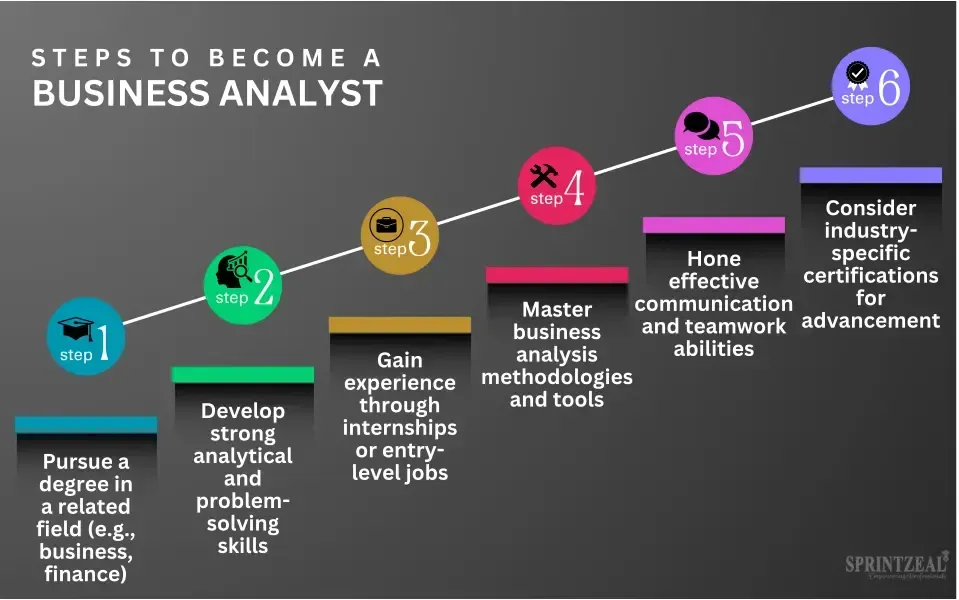Are you ready to embark on a fulfilling journey in the corporate world? Becoming a Business Analyst is a pivotal step for those looking to enhance their career prospects. With both job opportunities and salaries on the rise, now is the perfect time to explore this in-demand field. This role requires a unique blend of skills for Business Analysts, including data analysis and effective communication, which are essential for navigating complex business landscapes. By obtaining a business analysis certification and understanding the business analyst job requirements, you can position yourself as a key player in driving strategic decisions within any organization.
In today’s dynamic work environment, the role of a Business Analyst—often referred to as a business systems analyst or a business process analyst—has become increasingly vital. These professionals serve as the backbone of organizations by bridging the gap between technology and business needs. To excel in this field, one must possess not only a business analyst degree but also a comprehensive set of skills that facilitate the analysis and improvement of business processes. Whether you are considering a career pivot or seeking to enhance your existing qualifications, understanding the nuances of business analysis is essential for long-term success.
Understanding the Role of a Business Analyst
Business analysts are integral to organizations, functioning as the bridge between stakeholders and technical teams. They help businesses identify needs and recommend solutions that enhance productivity and efficiency. Their ability to analyze data and translate findings into actionable insights allows companies to make informed decisions that drive growth. This multifaceted role requires a deep understanding of various business operations, making it essential for analysts to stay updated with industry trends and best practices.
In addition to understanding technical requirements, business analysts are also tasked with communicating effectively across departments. They gather insights from users while ensuring that technical teams comprehend the business context behind their projects. This role often involves creating documentation, such as business requirements documents (BRDs) and functional specifications, which guide teams in delivering the right solutions. As businesses continue to evolve, the demand for skilled business analysts who can navigate complex challenges will only increase.
Essential Skills for Aspiring Business Analysts
To thrive as a business analyst, a mix of technical and soft skills is crucial. Business acumen is the foundation, allowing analysts to understand the market landscape and recognize opportunities for improvement. Strong analytical skills enable them to dissect data and derive meaningful conclusions that can influence business strategies. Furthermore, proficiency in tools like Power BI and Excel is increasingly important as businesses rely on data-driven insights to shape decisions.
Moreover, effective communication skills are vital for a business analyst. They must articulate their findings and recommendations clearly to stakeholders with varying levels of technical knowledge. This ability to convey complex ideas in an understandable manner fosters collaboration and ensures all parties align towards common objectives. Additionally, familiarity with business analysis techniques, such as SWOT analysis and Agile methodologies, can significantly enhance an analyst’s effectiveness in the role.
Pursuing a Business Analyst Degree
While not always mandatory, obtaining a degree in business analytics or a related field can significantly bolster your prospects as a business analyst. A relevant degree provides a foundational understanding of business principles and analytical techniques that are pivotal in this career. Institutions offering specialized programs, such as a Bachelor of Business Analytics or a Master of Science in Business Analytics, equip students with the necessary skills to succeed in this evolving field.
In addition to formal education, many universities offer practical experiences through internships, allowing students to apply their knowledge in real-world settings. This hands-on experience is invaluable, as it not only enhances learning but also helps build a professional network. Graduates with a business analyst degree are often more competitive in the job market, as employers seek candidates with a strong educational background and relevant experience.
Business Analysis Certifications to Enhance Your Career
As the field of business analysis continues to grow, obtaining professional certifications can set you apart from the competition. Certifications such as the Certified Business Analysis Professional (CBAP) or the Entry Certificate in Business Analysis (ECBA) demonstrate your commitment to the profession and proficiency in key skills. These credentials are recognized by employers and can significantly enhance your job prospects and potential earning power.
Additionally, pursuing business analysis certifications can provide you with up-to-date knowledge on industry standards and practices. Many certification programs offer specialized training in areas like data analytics and project management, aligning your skills with current market demands. By investing in your professional development through certifications, you position yourself as a valuable asset to future employers.
How to Build a Portfolio as a Business Analyst
Creating a portfolio is a crucial step in showcasing your skills and experience as a business analyst. This collection of work should highlight your completed projects, analysis reports, and any relevant case studies. A well-curated portfolio not only demonstrates your technical abilities but also illustrates your problem-solving skills and how you approach business challenges.
When building your portfolio, consider including diverse examples that reflect various aspects of business analysis. Projects that involve data analysis, process redesign, or strategic planning can effectively showcase your capabilities. If you lack formal experience, consider engaging in volunteer work or internships to gain practical experience that can be included in your portfolio.
Landing Your First Business Analyst Job
Once you have developed your skills and built a portfolio, the next step is securing your first position as a business analyst. Start by tailoring your resume to highlight your relevant experiences and skills that align with business analyst job requirements. Research common interview questions specific to the role and practice articulating your experiences and how they relate to the job.
Networking can also play a crucial role in your job search. Attend industry conferences, join professional organizations, and connect with other analysts on platforms like LinkedIn. Engaging in discussions and sharing insights can increase your visibility and open up potential job opportunities. Remember, persistence is key, and with the right strategy, you will find the opportunity to kickstart your career as a business analyst.
The Future of Business Analysis in 2025
As businesses increasingly rely on data to drive decisions, the role of the business analyst is expected to evolve significantly by 2025. Analysts will need to adapt to new technologies such as artificial intelligence and machine learning, which will enhance their ability to analyze vast amounts of data quickly and accurately. This shift will require continuous learning and a willingness to embrace new tools and methodologies.
Moreover, the growing emphasis on data privacy and security will also influence the business analyst’s role. Analysts will need to be well-versed in compliance regulations and data governance practices to ensure that their recommendations align with legal and ethical standards. As organizations continue to navigate an increasingly complex landscape, the demand for skilled business analysts will remain robust, making it an excellent career choice for aspiring professionals.
Networking and Professional Development for Business Analysts
Networking is a crucial aspect of professional development in the field of business analysis. Building connections with other professionals can lead to mentorship opportunities, job leads, and collaboration on projects. Joining professional organizations such as the International Institute of Business Analysis (IIBA) can provide access to valuable resources, training, and networking events that help analysts stay informed about industry trends and best practices.
Additionally, participating in workshops and conferences can enhance your skills and expand your network. Many industry events feature sessions on emerging tools and techniques, providing an opportunity for business analysts to learn and apply new strategies to their work. By actively engaging in the business analysis community, you not only enhance your knowledge but also position yourself as a committed professional in the field.
The Importance of Continuous Learning in Business Analysis
In the fast-paced world of business analysis, continuous learning is essential for maintaining relevance and competitiveness. The tools and techniques used in the industry are constantly evolving, making it imperative for analysts to stay updated on the latest advancements. Online courses, webinars, and certification programs provide opportunities for professionals to enhance their skills and knowledge in a flexible manner, catering to the demands of their schedules.
Moreover, embracing a mindset of lifelong learning allows business analysts to adapt to changing market conditions and emerging technologies. Analysts who invest in their professional growth are better equipped to tackle complex challenges and deliver innovative solutions that drive business success. By prioritizing continuous learning, you not only enhance your career prospects but also contribute to the overall effectiveness of your organization.
Frequently Asked Questions
What are the key skills required to become a business analyst?
To become a business analyst, you need a blend of technical and soft skills. Key skills include business acumen to understand various functions like finance and marketing, strong communication abilities to interact with stakeholders, data analysis skills to interpret and leverage data effectively, and knowledge of business analysis techniques such as SWOT analysis and Agile methods.
What are the educational requirements for a business analyst degree?
To pursue a career as a business analyst, a bachelor’s or master’s degree in fields such as business analytics, finance, marketing, or accounting is essential. Programs like a Bachelor of Business Analytics or a Master of Science in Business Analytics can provide the necessary foundation and skills for this role.
How can business analysis certification help in becoming a business analyst?
Business analysis certifications, such as the Entry Certificate in Business Analysis (ECBA) or the Certified Business Analysis Professional (CBAP), can enhance your qualifications and credibility in the field. These certifications demonstrate your knowledge and commitment to the profession, making you more competitive in the job market.
What are the common business analyst job requirements?
Common job requirements for business analyst positions include a relevant degree, strong analytical and problem-solving skills, proficiency in data analysis tools like Power BI or Tableau, and effective communication skills. Employers may also seek experience with business analysis methodologies and familiarity with project management.
What does a career as a business analyst entail?
A business analyst career involves identifying business needs, analyzing data to improve processes, communicating with various stakeholders, and designing solutions that drive business success. Business analysts play a crucial role in bridging the gap between IT and business teams, ensuring that projects meet organizational goals.
What steps should I follow to become a business analyst in 2025?
To become a business analyst in 2025, start by obtaining a relevant degree, pursuing business analysis certifications, building a strong portfolio with practical projects, and gaining experience through internships or entry-level jobs. Staying updated with industry trends and improving your skills continuously is also vital for career advancement.
What are the job prospects for business analysts?
The job prospects for business analysts are promising, with an expected growth rate of 9.7% in the U.S. from 2022 to 2032. As organizations increasingly rely on data and strategic analysis to make decisions, the demand for skilled business analysts will continue to rise.
Can I become a business analyst without a degree?
While a degree significantly enhances your chances of becoming a business analyst, it is possible to enter the field without one by gaining relevant certifications, building a portfolio of practical experience, and demonstrating your analytical skills through projects or internships.
What tools do business analysts commonly use?
Business analysts commonly use tools such as Excel for data analysis, Power BI and Tableau for data visualization, and project management tools like JIRA or Trello. Familiarity with these tools is crucial for effectively analyzing data and communicating findings.
How can I prepare for a business analyst interview?
To prepare for a business analyst interview, research common interview questions, understand the specific requirements of the role you’re applying for, and be ready to discuss your experience with business analysis techniques and tools. Practicing your responses and showcasing your projects can also help you stand out.
| Key Points | Details |
|---|---|
| Demand for Business Analysts | The market for business analysts is expected to grow by 9.7% between 2022 and 2032 in the U.S. |
| Role of Business Analysts | They improve business processes, make strategic decisions, and identify opportunities. |
| Key Responsibilities | 1. Build strategic plans 2. Solve business problems 3. Analyze data 4. Design processes |
| Skills Required | 1. Business acumen 2. Communication 3. Data analysis 4. Business analysis techniques |
| Path to Become a Business Analyst | 1. Obtain a relevant degree 2. Take online courses/certifications 3. Build a portfolio 4. Get an entry-level job |
Summary
To become a business analyst, it’s important to understand the growing demand for professionals in this field. Business analysts are crucial for organizations to improve processes and make informed decisions. By acquiring the right education, developing essential skills, and gaining practical experience, you can successfully embark on a rewarding career as a business analyst. Start your journey today to take advantage of the opportunities available in this dynamic profession.








